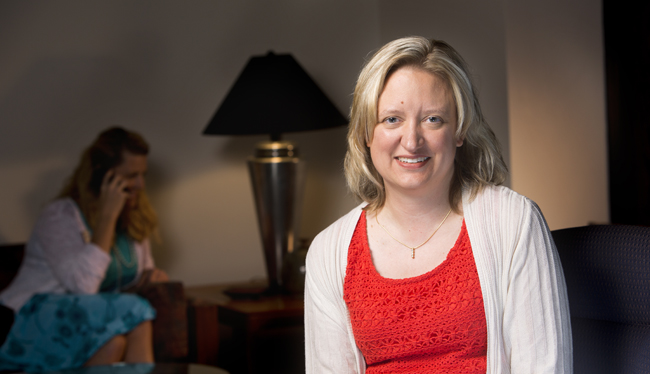
Kids with emotional and behavioral disorders are more likely to miss school, fail classes and drop out than any other group of students with disabilities. With support from a $3.2 million grant, UNL researchers are evaluating a unique new program that uses parent-to-parent support to encourage families to get the help they need to keep kids in school.
The four-year grant from the U.S. Department of Education's Institute of Education Sciences enables UNL researchers to evaluate the Parent Connectors Program. The team, led by Kristin Duppong Hurley, research associate professor of special education and communication disorders, will assess the program's effectiveness and, if proven valuable, will help expand the program.
Nationally, only 40 percent of students with emotional and behavioral disorders graduate from high school. The Parent Connectors Program was designed to help children with significant conduct and impulse problems, such as lashing out at teachers or fighting with classmates. These kids also frequently skip school and receive disciplinary action at school.
One of the biggest factors for these kids to be successful in school is early parental involvement, said Duppong Hurley: "Parents are the best advocates for their kids and for helping them get involved in school and mental health services."
Parent Connectors was developed by researchers at the University of South Florida with U.S. Department of Education funding. It's an intervention program designed to encourage parents of middle school-aged children with emotional or behavioral disorders to get involved in their children's education and to help them access available mental health and school services.
The program connects participants with other parents who have guided their own children with emotional and behavioral needs through the middle school years. The support parents are trained and, for one academic year, provide support, encouragement and guidance through weekly phone calls. Pilot studies in Florida showed this less intrusive, peer-based approach increased kids' school attendance and decreased suspensions.
UNL's team will evaluate the program's effectiveness with a much larger sample through a randomized control trial involving about 250 families of Nebraska middle school students in the Lincoln and metro Omaha areas who have Individualized Education Programs for emotional or behavioral needs.
Families that wish to participate will be randomly assigned to Parent Connectors or will receive services as usual.
By comparing the two groups, Duppong Hurley and colleagues will determine the program's effect on parental engagement as well as benefits to children, such as whether they access more mental health services, miss fewer days of school or receive fewer suspensions. Better attendance and behavior at school should translate into academic improvement later, she said. She will gather follow-up data a year after the program ends to determine if its benefits continue.
Duppong Hurley is working with Michael Epstein, William E. Barkley professor of special education and communication disorders, and Alexandra Trout, research associate professor of special education and communication disorders, on this project based at the Center for Child and Family Well Being at UNL's Barkley Memorial Center. The University of Nebraska Medical Center will provide statistical analyses. Boys Town, which serves at-risk and neglected children, will assist by implementing and coordinating services to families. The research team also will closely collaborate with the Healthy Families Project in Lincoln, which provides education, advocacy and support for parents of youth with emotional and behavioral needs.
"We're trying to hit these middle school ages to help keep kids in school during the high school years. That's when they really drop out," Duppong Hurley said. "Parent Connectors is a novel way of reaching these at-risk kids early on and to get them connected to services, but through their parents. I think that's a key part: hearing it from other parents who understand what they've been through."
-- Gillian Klucas, Office of Research and Economic Development